The last battles of Mithridates VI Eupator and the fate of the Pontic kingdom
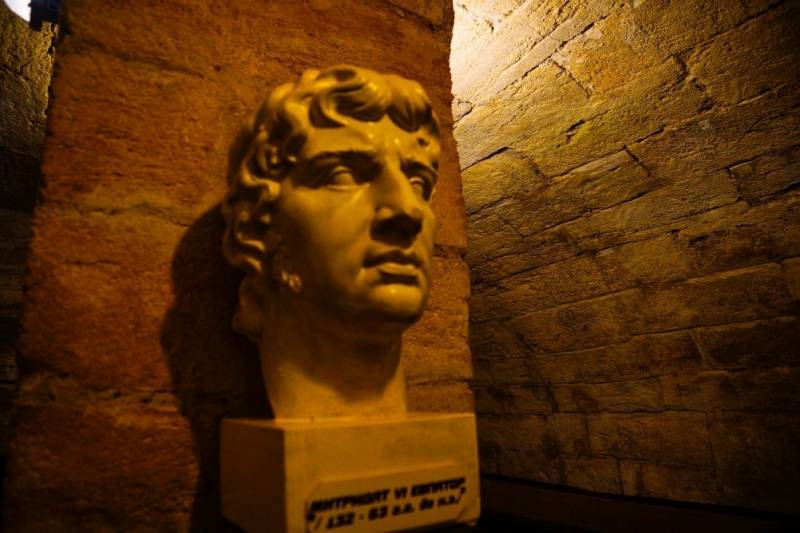
The story of the Third Mithridatic War in previous article we ended with the resignation of Lucullus. He was replaced as commander by the consul Manius Acilius Glabrion, who was once married to Sulla's stepdaughter, but on the orders of the dictator he was forced to divorce her, giving way to his pregnant wife Gnaeus Pompey (this woman died during childbirth). Now he, having not achieved any success in the war with Mithridates, at the beginning of 66 BC. e. ceded to Pompey and the army.
Pompey the Great vs Mithridates VI Eupator
Pompey had just completed a grandiose operation against the Cilician pirates, from whom he managed to clear the Mediterranean Sea.
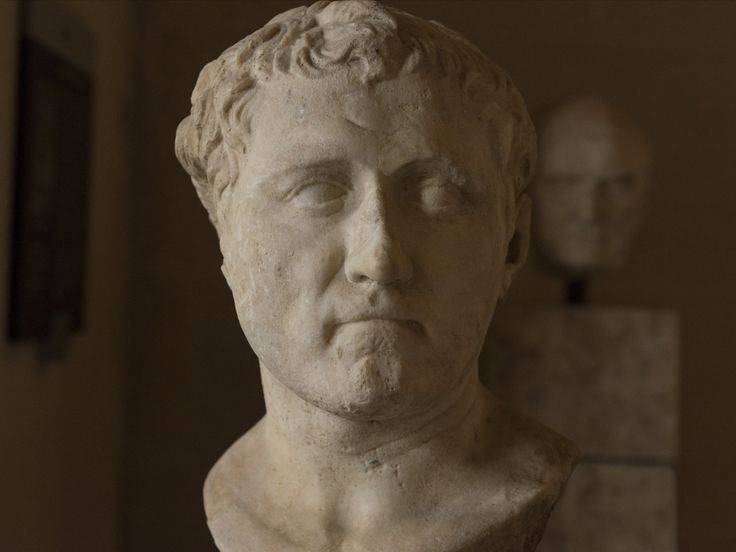
Sculptural portrait of Pompey, circa 70 BC. e., Paris, Louvre
And Mithridates by that time had already conquered Pontus, Cappadocia and threatened the Roman province of Asia. And in the battle at Zela, the legates of Lucullus, who had left for Rome, lost about 7 thousand soldiers, including 24 military tribunes and 150 centurions. Only the wound of Mithridates allowed the Romans to avoid encirclement and complete defeat.
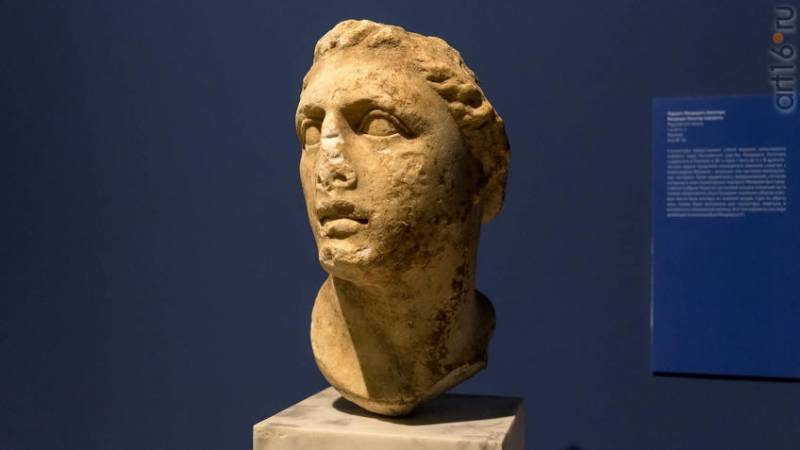
Sculptural portrait of Mithridates VI Eupator, XNUMXst c. BC e., the Hermitage
Arriving at the troops, Pompey entered into negotiations with the king, offering him to surrender to the mercy of Rome. Having received a refusal, he replenished the troops with people, bringing the size of the army to 40-50 thousand people, and sent ambassadors to Parthia, promising, in the event of an attack on Armenia, some provinces in Mesopotamia.
Meanwhile, Tigran II was opposed by his son, the grandson of Mithridates, who made an alliance with the Parthians. Now the Armenian king was not up to the support of his father-in-law. Soon he will be forced to conclude a humiliating peace treaty with Rome. And Pompey defeated the Pontic king in the last big battle near the city of Lycus. They say that the Pontic horsemen dismounted to support their infantry, but when the enemy cavalry appeared on the battlefield, they rushed to the camp where their horses stood. This caused panic in the ranks of the army of Mithridates, whose soldiers decided that their comrades were fleeing because they were beaten. In memory of this victory, Pompey founded the city of Nikopol here.
Mithridates VI in the Kingdom of Bosporus
Mithridates fled to Colchis, where he spent the winter of 66-65 in Dioscuria. BC e., and then moved to the territory of the Bosporan kingdom. Here his son Mahar ruled, by that time he had already rebelled against his father. Mithridates removed him from power and forced him to commit suicide.
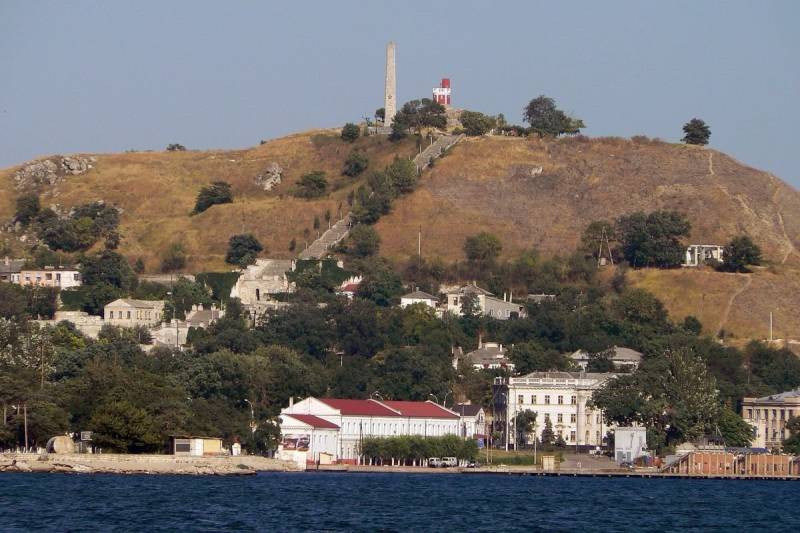
Mount Mithridates, Kerch - the former Bosporan Panticapaeum
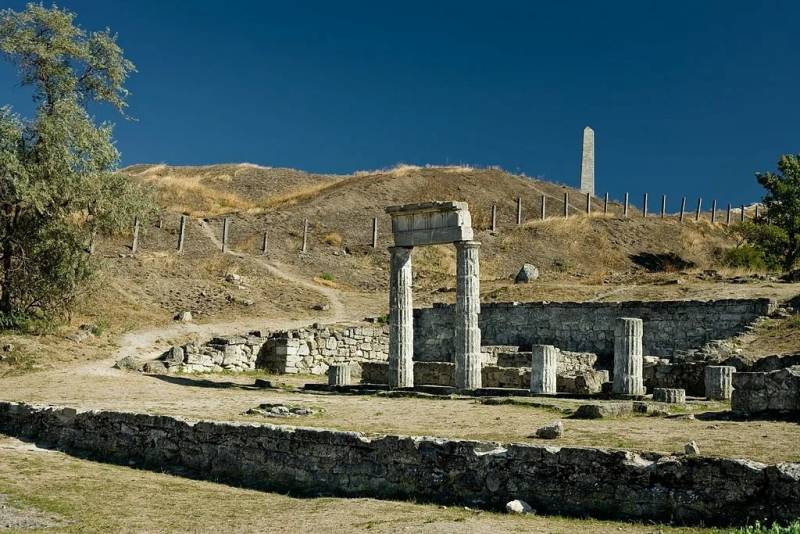
Ruins of Panticapaeum
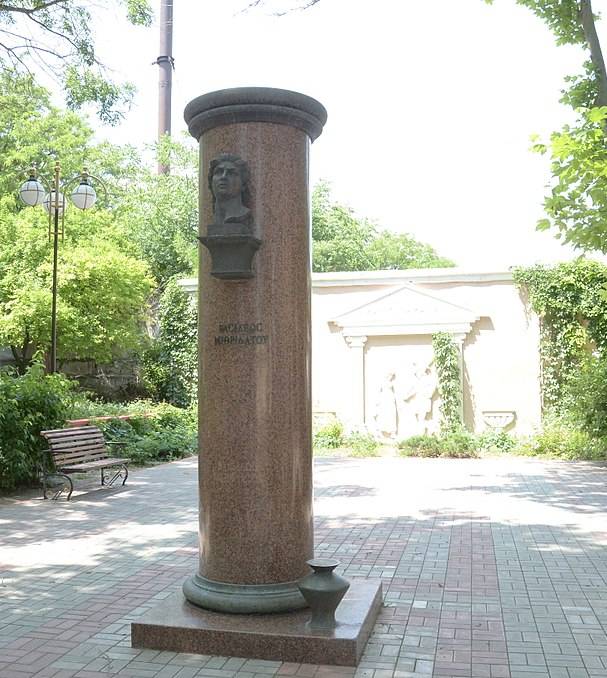
Monument to Mithridates VI at the foot of Mount Mithridates
Pompey left Mithridates alone for a while. In the Caucasus in 65 BC. e. he defeated the troops of the Iberian and Albanian tribes, but did not completely subdue them, citing "insurmountable obstacles from local snakes." He forced Tigran II to recognize himself as a vassal of Rome, and the Armenian king personally came to him and humbly handed over the crown taken from his head. If Mithridates had done the same in time, he might have saved part of his kingdom, but the proud Pontic did not go to such humiliation.
In 64 BC. e. Pompey completed the conquest of Pontus and created in Asia Minor several small states vassal to Rome - Cappadocia, Paphlagonia, Galatia. Then he easily captured Syria, making it a Roman province, and subjugated Judea to Rome.
Mithridates has not yet come to terms with defeat. He entered into negotiations with the barbarian tribes that lived in the Northern Black Sea region and on the Danube. Based on them, Mithridates planned to strike at Italy. However, to implement such a large-scale and ambitious plan, money was required, which he tried to collect from the Bosporans, primarily from the population of large and wealthy Greek cities, such as Phanagoria, Panticapaeum, Chersonesus, Feodosia, and some others. Mithridates responded to the speeches of disgruntled citizens with cruel repressions and executions. He achieved only an open rebellion, and Phanagoria (a city on the Taman Peninsula) was the first to rise.
Four sons and a daughter of Mithridates came out of the besieged fortress and surrendered. But the citadel was kept protected by his other daughter - Cleopatra. Literally on the eve of the fall of the city fortress, a squadron of Mithridates approached Phanagoria, evacuating its defenders.
By the way, in 2004, near Phanagoria under water, a tombstone was discovered dating back to the XNUMXst century BC. e. with the inscription: "Gypsicrates wife of Tsar Mithridates Eupator":
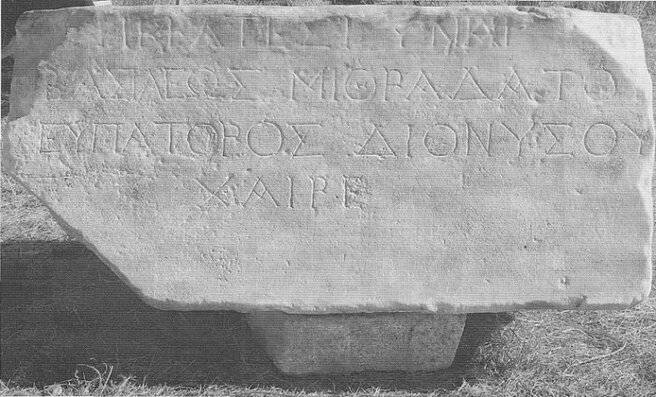
Stone with the name of Hypsicrates, the wife of King Mithridates
She is mentioned by Plutarch, who reports that in one of the battles, Hypsicrates, the former concubine of Mithridates, who became his legal wife, was next to the king: dressed in men's clothes, she, sitting on a horse, "fought like a valiant warrior."
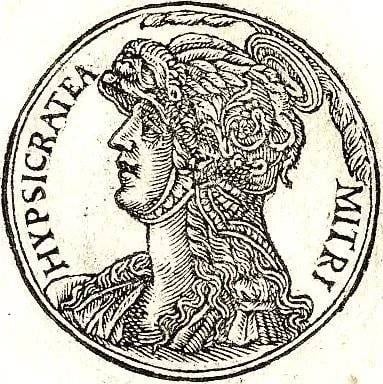
Coin depicting Hypsicrates
And in 2012, a bireme from the time of Mithridates VI was found under water, the wooden parts of which retained traces of a fire.
Death of Mithridates VI Eupator
But back to 63 BC. e. The example of the rebellious Phanagoria was then followed by Chersonese, Theodosius and Nymphaeum. Only the capital city of Panticapaeum remained loyal to Mithridates. But Farnak, beloved son of Mithridates, betrayed his father, and he managed to lure the army and navy to his side. In 63 BC. e. Mithridates with people loyal to him was besieged in the royal palace of Panticapaeum. Realizing that he was doomed, the former great king decided to poison himself, but this attempt was unsuccessful: either the poison was of poor quality, or it made itself felt immune to poisons, which he tried to develop in himself as a teenager, when he was hiding from relatives. Yes, and becoming king, as they say, he continued to take small doses of poisons, the effect of which was tested on criminals sentenced to death. Appian states in his writing "Stories Rome":
This form of resistance to poison is still called mithridatism.
Dio Cassius, speaking of the last hours of the life of Mithridates, also writes that this king took antidotes:
And this author explains unsuccessful suicide attempts with a sword by the weakness of Mithridates' hands due to age and the effect of poison, which, without killing him, nevertheless had some effect on the body.
About what happened next, Appian and Dio Cassius tell differently. Appian gives this version of the death of Mithridates:
“I won a lot from your right hand against my enemies. I will profit the most from this if you kill me and save him from the danger of being at the head of the Roman triumph, who for so many years was an autocrat and ruler of such a great kingdom, but now cannot die from poison, because, like a fool, he defended himself. from the poison of others. Although I watched and guarded against all the poisons that a person takes with food, I did not take care of the domestic poison, which was always the most dangerous for kings - about the betrayal of the army, children and friends.
Bituit, who was thus addressed, rendered the desired service to the king.
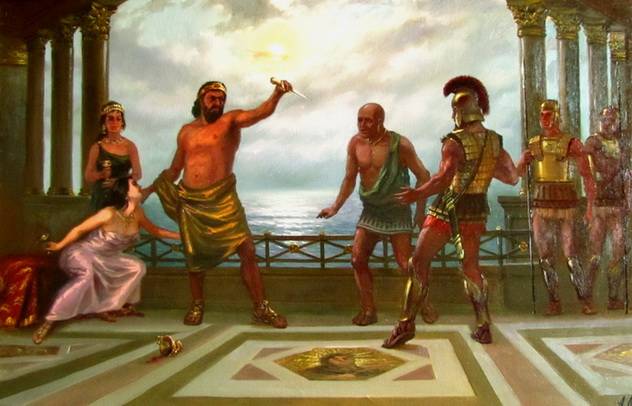
Luzgin A. Death of Mithridates
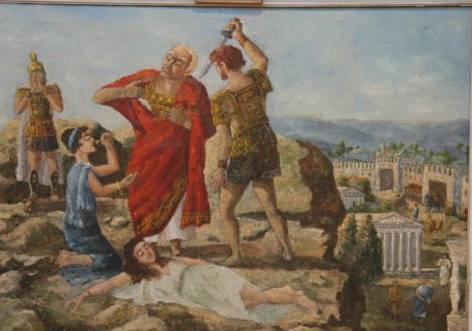
N. Xandopulo. Death of King Mithridates VI of Eupator
But Dio Cassius claims that Mithridates' death was violent, and he was treacherously killed by his own soldiers:
Thus ended the more than 50-year reign of Mithridates VI. And with his death, the Third Mithridatic War ended.
Completion of the history of the Pontic kingdom
Farnak recognized the power of the Romans and was left to rule the Bosporan kingdom, with the exception of Phanagoria. Trying to appease Pompey, he sent him the body of his father by ship. The Roman commander showed nobility to the defeated enemy, ordering with honor to bury him in his homeland. According to one version, the tomb of Mithridates VI was located in the first capital of Ponta Amasia, according to another - in Sinope. When another civil war began in the Roman Republic, Pharnaces II, not far from Nikopol founded by Pompey, defeated the Roman army of Domitius and for a short time returned Cappadocia and Lesser Armenia.
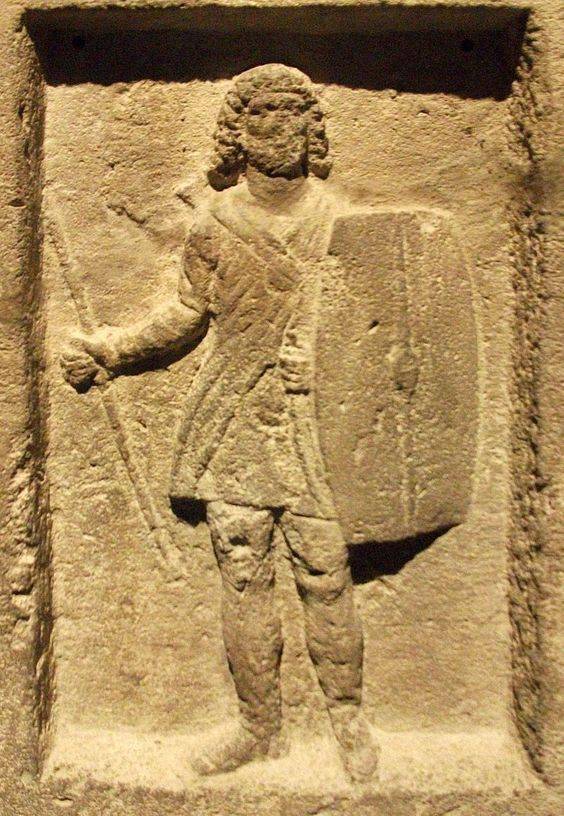
Bosporus warrior on a stele from Patikapaion, XNUMXst century BC BC e.
However, Farnak was soon defeated at the Battle of Zela by Caesar, who then sent the famous short report to Rome: “Veni, vidi, vici” (“I came, I saw, I conquered”).
Farnak fled to the Crimea, where he died in battle with his own commander, the Panticapean Greek Asander, to whom he entrusted the management of the Bosporus during his absence. Asander married the daughter of Pharnaces (granddaughter of Mithridates) Dynamis.
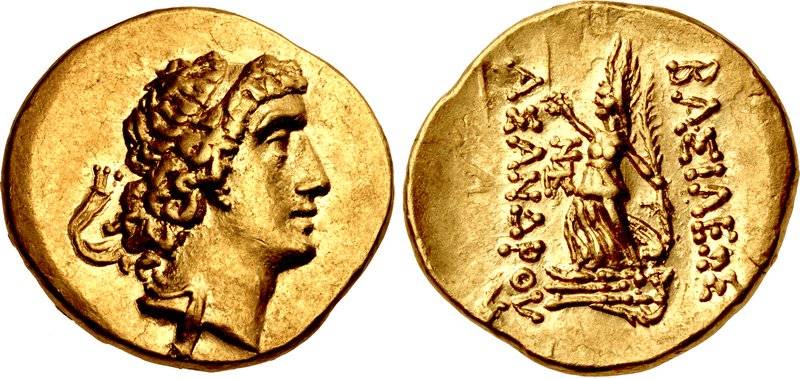
Gold coin of the Bosporus king Asander
After his death, the state was ruled by Dynamia, who, under pressure from Rome, was forced to marry Polemon, a Greek from the city of Laodice, a former subordinate of Mark Anthony, who had previously been the prefect of Cilicia and Lycaonia, and then received the throne of King Pontus from this triumvir.
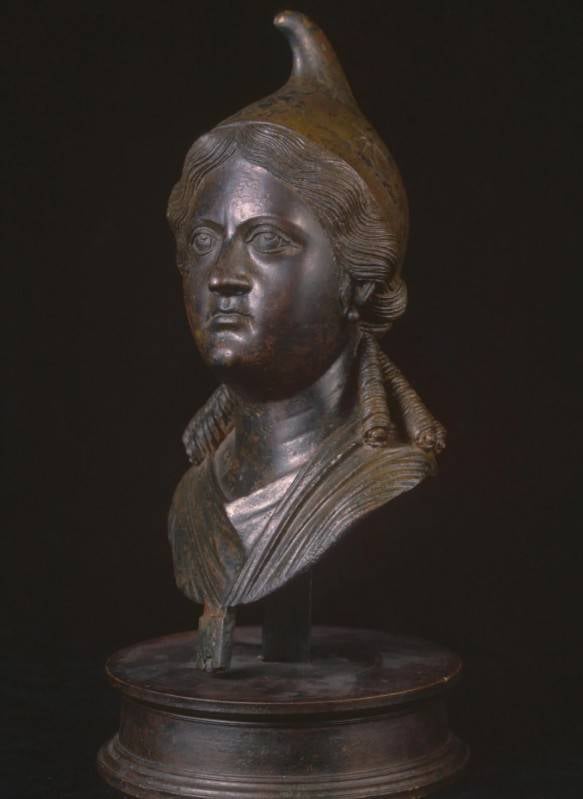
Queen Dynamia, bronze bust found in 1898, Hermitage
The son of Asander and Dynamia - Aspurg, the great-grandson of Mithridates VI received the status of "friend of the Roman people" and still retained some independence, although he minted coins with portraits of Roman rulers.

Coins of King Aspurg
The further history of the Bosporan kingdom, which existed until the 520s–530s, until it came under the rule of Byzantium, is beyond the scope of this article.
So, the expansion of the Pontic kingdom under Mithridates VI turned out to be ephemeral. After the defeat of this king, Rome annexed to its possessions its western part, which became the province of Bithynia and Pontus. The eastern part of Pontus, called the Little Armenian Kingdom, was transferred to the king of Galatia Deiotarus Philoromeus (the leader of the Gallic tribe of the Teutobogians), who in 48 BC. e. supported Pompey in his war with Caesar. Later, Mark Antony donated part of Pontus to the already mentioned Polemon, whose second wife was the granddaughter of the triumvir Pythodorides.
The Pontic kings became obedient vassals of Rome, but in 62 Nero finally abolished this state. The fact is that Nero was also a descendant of Mark Antony: his maternal grandmother was Anthony the Elder, the daughter of Mark Antony and the sister of Octavian Augustus. And therefore, Nero believed that, as a relative of Queen Pythodoris, he had the right to the throne of Pontus. Its last king, Polemon II (a descendant of Mark Antony), refused to fight and abdicated.
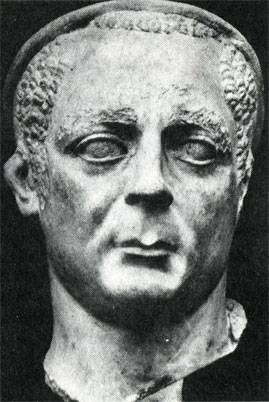
Sculptural portrait of the last king of Pontus Polemon II, Copenhagen Glyptothek
Emperor Constantine I the Great divided the former possessions of the Pontic kings into two provinces. Western in honor of his mother Helena was named Helenopont, we remember that the capital of this province was Amasia. The eastern province was named Pontus Polemonos, and Neocaesarea became its capital.
Information